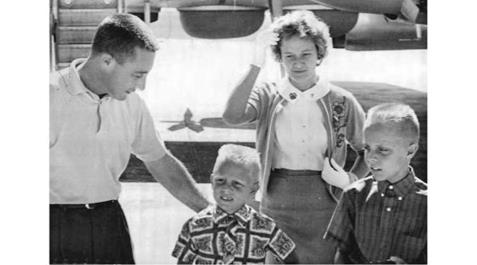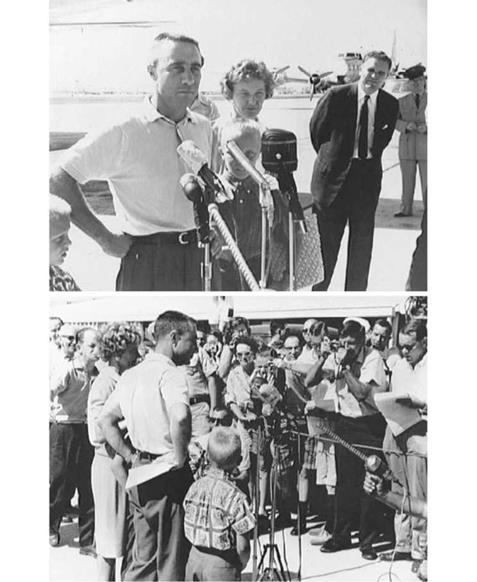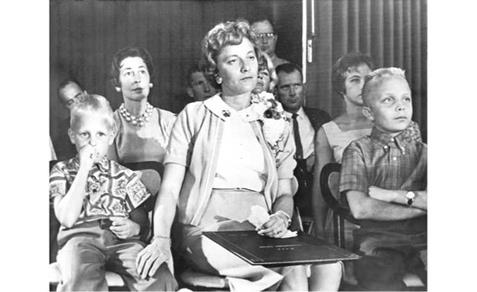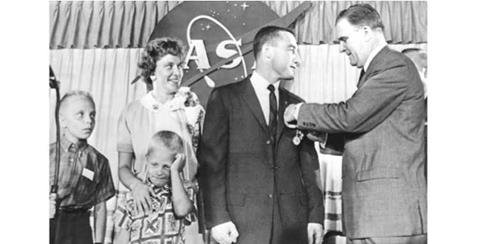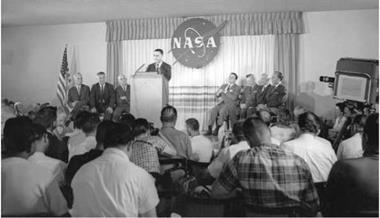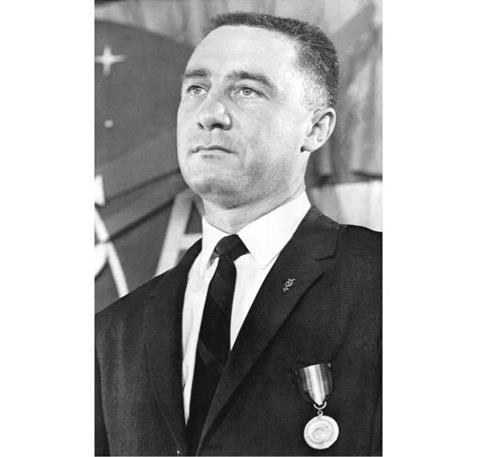BACK AT THE CAPE
Meanwhile Grissom had risen at around 6:30 a. m. and eaten a large hot breakfast ahead of a peaceful, relaxing morning out of sight of the press before flying back to Patrick AFB at the Cape aboard a C-54 Skymaster transport plane, together with Deke Slayton and other passengers. Once there, he would address a formal press conference on the results and different aspects of the MR-4 mission.
That afternoon the C-54 landed at the air base where hordes of news reporters and officials were waiting to greet the astronaut. Standing in front of an official NASA limousine were the excited wives of the other six astronauts, holding up a huge banner saying “We’re Proud of You All.” Sadly for Grissom, however, he also landed in the midst of a gathering pall of public blame and suspected human failure which was about to descend upon the nation’s newest spaceman.
Everything seemed to be fine to Gus Grissom as he stepped from the plane into a typically hot Florida summer’s day, waving and smiling. At the foot of the stairs he hugged and kissed Betty and their two boys before being ushered off to shake hands with a throng of officials and well-wishers. He was then led into a small annex of a huge tent that had been specially erected for the occasion. Here the family enjoyed a few private moments alone before they were driven to the Starlight Motel in Cocoa Beach where Grissom was to change his clothes and prepare himself for the formal press conference.
Once they had arrived at the motel, Betty and the boys were shown to their seats while Gus – filled with apprehension and unease – stood on a platform facing the reporters and photographers as he prepared to answer their questions. He knew one of the main topics would be the loss of Liberty Bell 7, and he simply didn’t have any satisfactory answers to offer them at that time. He could only explain what he had done and offer strenuous denials that he was somehow at fault.
|
Grissom’s family was there to greet him on his arrival at Patrick AFB. (Photo: UPI) |
|
As NASA Administrator James Webb looks on, Grissom and his family pose for the hordes of photographs at Patrick AFB prior to his press conference. (Photos: NASA) |
To resounding applause, NASA Administrator James Webb introduced Grissom by saying, “I could present Capt. Grissom as an aeronaut, a test pilot, a graduate of that school of experimental flying through which over the 58 years since the Wright Brothers flew, a handful of brave men have taken the personal risks necessary to prove in flight the new aircraft ideas and designs which now benefit so many millions through air transport and add so much to our national security. I could present him as one of the seven astronauts. These seven men have devoted almost three years of their lives to providing the pilot element in the Mercury system, utilizing our most advanced science and technology for the purpose of producing machines capable of aiding man in exploring and extending his knowledge of the universe… for the benefit of all mankind.” Webb then presented the press-nervous Grissom with the space agency’s Distinguished Service Medal for his “outstanding contribution to space technology.”
|
The Grissom family at the Starlight Motel press conference. Astronauts Wally Schirra and Deke Slayton are seated behind Betty Grissom. (Photo: NASA) |
|
NASA Administrator pins the space agency’s Distinguished Service Medal on Grissom’s lapel as his family looks on. (Photo: Associated Press) |
For his part, Grissom said he was anxious to return to work on the space program and would be back on the job Monday. He repeatedly used the word “fascinating” in describing his first space flight, and said he kept peeking out of his window at the view. He described seeing a band around the Earth that went from light blue to dark blue and then to black, while the horizon appeared to be from 600 to 800 miles from him at the height of his flight.
“Looking out the window – it looked more like a keyhole to me – I could first see blue sky after I went through one little layer of cloud that was floating over the Cape,” he said of his ascent into space. “Suddenly the sky went from blue to pitch black. As I looked through my picture window I could see one brilliant star in the middle of the windshield.” This “star” would later be determined to be the planet Venus.
|
Gus Grissom reflects on his flight for the news media. (Photo: NASA) |
Grissom said Liberty Bell 7 experienced much less vibration than Shepard’s spacecraft due to some design changes. As the capsule tilted into its “turnaround” position, he said he got his first view of the horizon. “It was really fascinating,” he reflected. “The Earth was very bright and very round.” He also reported that there was “stuff floating around” inside the capsule during the period of weightlessness, and that “there was in the cockpit some debris – a washer, dirt – the normal debris that you’ll find floating around any airplane.”11
As Betty Grissom and her co-author Henry Still later wrote in Starfall: “The reporters skipped quickly over the successful aspects of the flight (they already knew that) and probed around the question of whether Grissom had contributed to the loss of the Liberty Bell by accidentally bumping the plunger which blew the hatch. Controlling his temper, Gus patiently explained how he had been ‘lying there minding my own business’ when the hatch unaccountably blew off.”
There was, the authors recalled, a good deal of innuendo going around that NASA officials might be somehow trying to cover up a case of pilot error.
“Barroom psychologists whispered the possibility that Gus Grissom was accident – prone. This was typical human perversity, looking for the clay feet of heroes, but it was ironic to those who knew Gus as an outstanding pilot and engineer, a man who devoted endless hours to methodical planning of ways to work around emergency situations.”12
To a question about whether he ever felt his life was in danger, Grissom answered in his usual honest and considered way, “Well, I was scared a good portion of the time. I guess this is a pretty good indication.”
“You were what?” called out one reporter.
“Scared. Okay?” Grissom answered. It was a mistake. His renowned frankness and honesty did not serve him well on this occasion, as the next day’s newspapers brought such unjust and sensational headlines such as “Astronaut Admits he was Scared,” and “I Was Scared: Grissom.” No mention was made of his superhuman struggles against the elements in desperately trying to assist in the retrieval of his sinking spacecraft, an act of incredible bravery which could so easily have cost him his life.
|
An evidently exhausted Grissom during the press conference, wearing his Project Mercury lapel pin and the Distinguished Service Medal. (Photo: NASA) |
James Webb had substituted for the President of the United States in presenting Grissom with the Distinguished Service Medal at the start of the press conference. The reason given was that John Kennedy was dealing with the political aftermath of the Bay of Pigs invasion some three months earlier – although this hadn’t precluded a gala White House medal presentation for Alan Shepard the previous month. There would be no White House celebration, no meeting with First Lady Jackie Kennedy for Betty Grissom, no ticker-tape parade through the streets of New York. There was just muted praise and passing recognition, which the astronaut and his wife simply could not comprehend. The guy was a hero; surely they were not blaming him for losing his spacecraft?
Things became even more evident after the press conference when the family was bundled into a car and driven across to Patrick AFB and dropped off at a guesthouse in the base’s VIP quarters. They were told that this would ensure a little privacy and security away from the prying eyes of reporters. Meanwhile the other astronauts and their wives were given comfortable accommodation at the Holiday Motel some ten miles north in Cocoa Beach, where they would enjoy post-flight celebration parties. Incredibly, Gus Grissom would have to leave early in the morning; he had been told to report back to work the next day.
“The guesthouse setup didn’t suit Betty,” Henry Still wrote in Starfall. “She did not know how many days they would be there. It was across a busy highway from the Atlantic Ocean beach. Betty’s controlled resentment at being left alone to fend for herself and the family boiled over when she checked the refrigerator and found it stuffed with bacon and eggs and other food.”
“‘What do these people think I am going to do?’ she demanded. ‘I am not going to cook!’”
There was no television set for the kids to watch, no car, and if they wanted to go to the beach they’d have to cross over the highway with its fast-moving traffic. After she had complained to her husband about the unfairness of the situation he got on the phone and booked them into the Holiday Motel along with the rest of the astronauts and their families. They repacked their bags and called a cab.
“I really don’t know what they expected me to do with my time there at Patrick,” Betty later wrote. “I think I’d have been ready to commit suicide if I’d have stayed in that place all day waiting for him to come back home. I’d have been a complete wreck, especially with two little kids. What was I supposed to do with them? No one knew where I was. I might have gotten on the phone and said: ‘Somebody come get me.’ But it all just struck me wrong. I told Gus: ‘This is one time I am not writing a thank-you note.’ And I didn’t, although I’m sure their intentions were good.”13











